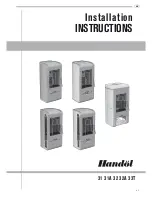
14
WAYS TO PREVENT AND KEEP UNIT FREE OF
CREOSOTE
1. Burn with air control open for several minutes at
numerous intervals throughout the day during the
heating season, being careful not to over-fire unit.
This removes the slight film of creosote accumulated
during low burn periods.
2. Burn stove with draft control wide open for several
minutes every time you apply fresh wood. This
allows wood to achieve the charcoal stage faster
and burns wood vapours which might otherwise be
deposited within the system.
3. BURN ONLY SEASONED WOOD. Avoid burning wet
or green wood. Seasoned wood has been dried for
at least one year.
4. A small hot fire is preferable to a large smouldering
one that can deposit creosote within the system.
5. Establish a routine for the fuel, wood burner and firing
technique. Check daily for creosote build-up until
experience shows how often you need to clean to be
safe. Be aware that the hotter the fire, the less
creosote is deposited and weekly cleanings may
be necessary in mild weather even though
monthly cleanings may be enough in the
coldest months. Contact your local municipal
authority for information on how to handle a
chimney fire. Have a clearly understood
plan to handlea chimney fire..
WARNING: Things to remember in case of chimney fire:
1. CLOSE DRAFT CONTROL.
2. CALL THE FIRE DEPARTMENT.
ASH DISPOSAL
This unit features a convenient ash lip for easy removal
of ash. During constant use, ashes should be removed
every few days, or whenever ashes get to three to four
inches deep in the firebox. Remove ashes only when
the fire has died down and the ashes have cooled. Even
then, expect to find a few hot embers.
Disposal of Ashes:
Ashes should be placed in a steel container with a tight-
fitting lid. The container of ashes should be moved out-
doors immediately and placed on a noncombustible floor
or on the ground, well away from combustible materials,
pending final disposal. If the ashes are disposed of by
burial in soil or otherwise locally dispersed, they should
be retained in the closed container until all cinders have
thoroughly cooled. Other waste shall not be placed in
this container.
IMPORTANT
HELPFUL HINTS
1. What is the correct way to start a fire?
a) You will need small pieces of dry wood (kindling)
and paper. Use only newspaper or paper that has
not been coated or had unknown materials glued or
applied to it. Never use coated (typically advertising
flyers) or coloured paper.
b) Open the door of the wood stove.
c) Crumple several pieces of paper and place them in
the center of the firebox and directly on to the fire
bricks of the wood stove. Never use a grate to
elevate the fire.
d) Place small pieces of dry wood (kindling) over the
paper in a Teepee manner. This allows for good air
circulation, which is critical for good combustion.
e) Light the crumpled paper in 2 or 3 locations.
Note: It is important to heat the air in the stovepipe
for draft to start.
f) Fully open the air control of the wood stove and
close the door until it is slightly open, allowing for
much needed air to be introduced into the fire box.
Never leave the door fully open as sparks from the
kindling may occur causing injury or property
damage. As the fire begins to burn the kindling,
some additional kindling may be needed to sustain
the fire. DO NOT add more paper after the fire has
started.
g) Once the kindling has started to burn, start by
adding some of your smaller pieces of seasoned (dry)
firewood. NOTE: Adding large pieces at the early
stages will only serve to smother the fire. Continue
adding small pieces of seasoned (dry) firewood,
keeping the door slightly open until each piece starts
to ignite. Remember to always open the door slowly
between placing wood into the fire.
h) Once the wood has started to ignite and the smoke
has reduced, close the wood stove door fully. The
reduction of smoke, is a good indication that the draft
in the chimney has started and good combustion is
now possible. Larger pieces of seasoned (dry) fire
wood can now be added when there is sufficient
space in the Firebox. Adjust the air control setting to
desired setting.
I) Note: The lower the air control setting the longer the
burn time of your firewood.
2. What type of wood is best to use as Firewood?
Dry seasoned hardwood should be used. Avoid
green unseasoned wood. Green wood, besides
















































